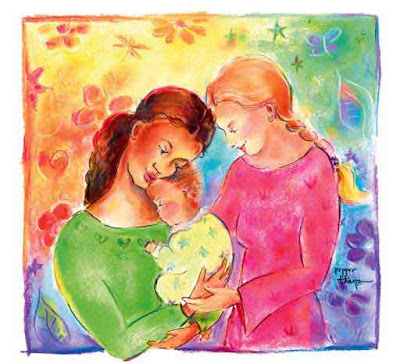*I Found this article on livestrong.com - It is so important that mothers have access to healthy foods during their pregnancy. Once again, as always, there are quite a few points that could be debatable but majority of the information is sensible and beneficial.
Photo Credit Creatas Images/Creatas/Getty Images
Diet for a Holistic Pregnancy
Jun 26, 2011 | By Jan Sheehan
A holistic pregnancy is one that keeps things as natural as possible. Eating foods free of pesticides, hormones, antibiotics and artificial ingredients is important to many women planning holistic pregnancies. A diet for a holistic pregnancy can help give your baby a healthy start as long it includes essential prenatal nutrients, according to Elisa Zied, R.D., a licensed dietitian specializing in prenatal and children's nutrition and author of "Feed Your Family Right."
Description
A diet for a holistic pregnancy usually emphasizes organic foods, which are grown, handled and processed without pesticides, genetic modification, hormones and antibiotics. Pesticides you consume during pregnancy are shared with your baby in utero and eventually come through in breast milk, according to the "What To Expect When You're Expecting" website. Organic fruits and vegetables are also likely to be fresher than non-organic produce, which may translate to better nutrition because many nutrients diminish as produce ages, Zied notes. Along with organic produce, a diet for a holistic pregnancy may include grass-fed beef, cage-free chicken and eggs, hormone-free milk and organic yogurt.
Description
A diet for a holistic pregnancy usually emphasizes organic foods, which are grown, handled and processed without pesticides, genetic modification, hormones and antibiotics. Pesticides you consume during pregnancy are shared with your baby in utero and eventually come through in breast milk, according to the "What To Expect When You're Expecting" website. Organic fruits and vegetables are also likely to be fresher than non-organic produce, which may translate to better nutrition because many nutrients diminish as produce ages, Zied notes. Along with organic produce, a diet for a holistic pregnancy may include grass-fed beef, cage-free chicken and eggs, hormone-free milk and organic yogurt.
Foods to Include
Foods to Include
Organic spinach and asparagus are good sources of folate, a B vitamin needed during pregnancy to prevent neural tube defects. Most breakfast cereals are enriched with this important prenatal nutrient, but choose a natural, whole-grain brand without artificial ingredients. Most cereals are also fortified with iron. During pregnancy, a woman's iron needs double. You'll need plenty of calcium, found in organic milk and yogurt, as well as vitamin D to help build your baby's bones, according to MayoClinic.com. Salmon is an excellent source of vitamin D, but Zied recommends choosing wild fish rather farm-raised, which may contain chemical pollutants. Wild salmon is also loaded with protein and omega-3 fatty acids to fuel your baby's growth and aid brain development.
Foods to Avoid
Steer clear of packaged and processed food to get back to basics and provide natural nutrition for your developing baby. The American Pregnancy Association advises avoiding unwashed vegetables to prevent exposure to toxoplasmosis, a bacteria that could be harmful to an unborn baby. Don't eat sushi or large varieties of fish, including shark, king mackerel and swordfish. They could have high levels of mercury, a toxin that could damage your baby's brain and cause developmental delays. Soft cheeses, like Brie, and deli meat are also off limits because they could contain listeria, a bacteria that could trigger miscarriage. Caffeine has also been linked to miscarriages in some studies.
Tips
When you can't buy organic, be sure to wash produce meticulously. Also peel fruits and veggies before eating. Pesticides are typically on the peels, rather than inside, Zied notes. It's especially important to eat lots of protein during your last trimester when your baby is growing by leaps and bounds in anticipation of entering the world, according to Zied. Protein will also give you energy while your body is working overtime. It's best to get your protein and all your holistic nutrition in small bites. Zied advises eating five to six small meals throughout the day to keep your energy up and provide a steady stream of nutrients to your developing baby.





.jpg)
